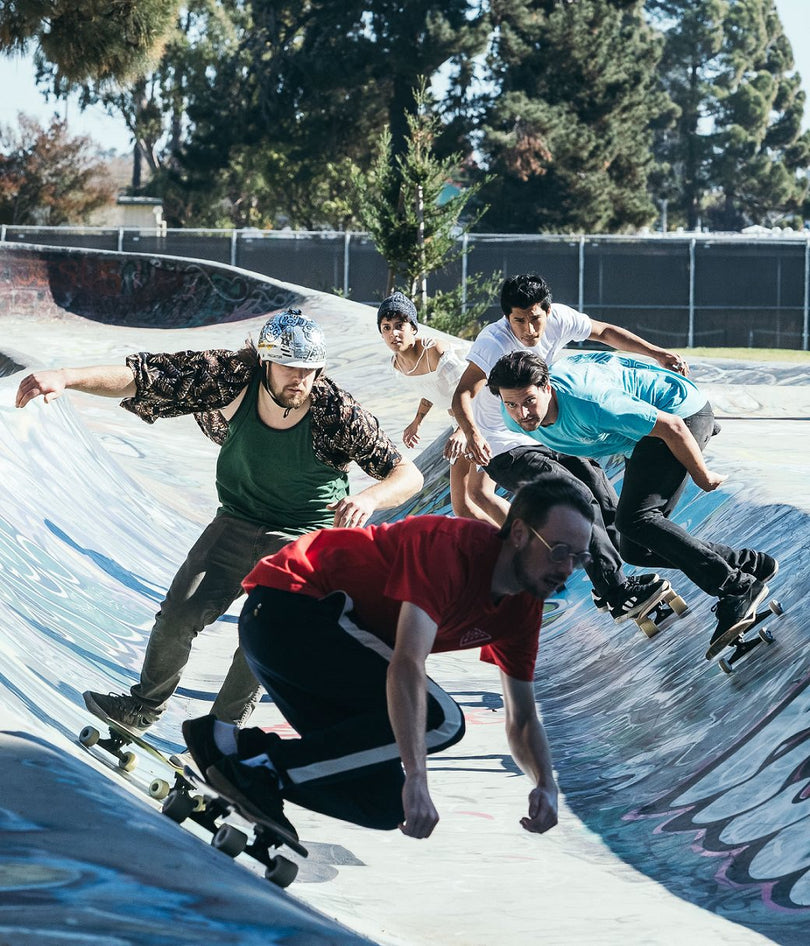Wondering about skateboarding vs. surfing? Then this is the piece for you. Skateboarding and surfing are similar in many ways. In both sports, athletes use boards as the primary form of transportation and utilize the power of gravity to move through different environments. Both activities require balance, agility, and coordination, as well as strength and endurance. While surfers rely on waves for their momentum, skateboarders take advantage of changes in terrain like ramps, pipes, or rails to propel themselves forward. The two sports have also evolved from a recreational activity into a full-fledged professional sport with competitions all over the world.
However, there are some main differences between skateboarding and surfing which set them apart from one another. For example, surfers usually ride in an upright position while skateboarders often perform tricks and stunts with the board in a horizontal orientation. In addition, surfers rely on natural elements like wind and waves for their momentum while skateboarders use man-made obstacles to gain speed. Skateboarding also offers a greater variety of tricks than surfing because of its more versatile nature. Finally, the primary materials used to make the boards differ greatly between the sports; surfboards are traditionally made from foam and fiberglass while skateboards are typically composed of plastic or wood.
Overall, both skateboarding and surfing can be classified as extreme sports that require strength, stamina, control, and creativity. Whether you prefer to ride on land or sea, these two activities offer an exhilarating way to experience nature at its fullest potential. With some practice and hard work, you can experience the thrill of conquering gravity and riding with the current.
Are skateboarders good at surfing?
Skateboarding and surfing may appear to have many similarities, but the two sports actually require quite different sets of skills and techniques. Skateboarding requires an understanding of physics such as momentum, gravity, torque, and balance. Skateboarders must also be adept at maneuvering their boards quickly in tight spaces while maintaining control over their movements. Surfing on the other hand requires more of a focus on wave reading, timing, positioning and agility. While skateboarders may possess some of these skills that are beneficial for surfing, they do not always translate directly into success in the water.
Moreover, skateboarding does not usually involve physical conditioning or strength-building exercises that are typically required for successful surfers, who need strong upper body, core and leg muscles for paddling out past the break and for longer rides in the water. Therefore, while skateboarding skills may look impressive to novice surfers, it is important to understand that there is a big difference between the two sports. Ultimately, skateboarders who transition into surfing will need to practice both on land and in the water if they are serious about becoming proficient at it.
In conclusion, while skateboarding can be beneficial in some respects for aspiring surfers, skill transferral cannot be assumed across all aspects of these two sports. It is important for potential surfers to remember that successful surfing involves a combination of physical conditioning and wave reading skills - which are not directly related to what they may have picked up from skateboarding. With a concerted effort and dedication to both sports, however, it is possible for skateboarders to become competent surfers over time.
Is surfing anything like skateboarding?
Surfing and skateboarding both require a certain degree of skill and balance, but they are two very different activities. Surfing takes place in the ocean, while skateboarding is done on land. In surfing, you use an outside force (the wave) to propel yourself forward, whereas in skateboarding, you need to move your body back and forth to generate momentum.
Additionally, surfers must be able to read the waves in order to know when to turn or change direction; this is not something that is necessary for skateboarders. In terms of safety equipment, surfers typically wear wetsuits or rash guards as well as leashes for their boards; meanwhile skaters usually just wear helmets and pads. Finally, the tools used for surfing and skateboarding are quite different; surfers use longboards, shortboards, or skim boards, while skaters ride decks with four wheels. Ultimately, while there may be some similarities between the two activities, they are very different in terms of technique and equipment.
Therefore it can be concluded that although surfing and skateboarding have a few common elements, they are fundamentally distinct sports. Each requires its own unique set of skills and will result in a completely different experience. So while you might enjoy both activities, don't expect them to feel exactly the same.
Is surf skating easier than skateboarding?
When it comes to the question of whether surf skating is easier than skateboarding, it really depends on a person's experience with each type of board and their own style. Skateboarding requires good balance and coordination as well as an understanding of basic tricks in order to be successful, while surf skating relies more heavily on feeling the wave-like motion as you move with the board.
For those just getting into either activity, they may find that surf skating is slightly easier because it requires less focus and precision when performing tricks or turns. However, experienced skateboarders may have an advantage over newcomers in terms of understanding how to control their boards and knowing what techniques work best.
It's important to remember that both sports require time and dedication in order to become proficient. While surf skating may be easier for some, it is still a skill that needs to be practiced in order to perfect the movement. Skateboarding takes even more patience and practice as it requires a greater level of precision when executing tricks or turns.
Ultimately, whether you find surf skating or skateboarding easier will come down to your own experience and preferences. Both activities require balance, coordination, and technique - so take your time learning each board type until you find one that suits you best.
Is surfing the toughest sport?
Surfing is considered by many to be one of the toughest sports. The unpredictable nature of waves, the challenges presented by ocean currents and rip tides, and the often-treacherous conditions make it a difficult sport to master.
In addition to the physical challenges that come with surfing, there's also a mental challenge. Surfing requires quick thinking and decision-making skills in order to read the waves and select an appropriate line while avoiding dangerous areas. It requires strong concentration skills as well as an awareness of potential hazards such as rocks or shallow reefs that could cause injury if hit at high speed.
Furthermore, unlike most sports where athletes compete against each other for points or a finish line, surfers are competing against themselves in a never-ending search for the perfect wave. This means that each session is an individual challenge and no two days will be the same.
All of this adds up to a truly tough sport that requires dedication, knowledge, skill, and strength to master. It is a demanding activity but also immensely rewarding when done correctly. Being able to surf with confidence brings great satisfaction and joy that can't easily be found elsewhere. It’s not just about riding waves - it’s about being in tune with nature and pushing one’s physical and mental boundaries to become more competent in the water. Is surfing the toughest sport? Without doubt, it certainly isn't easy.
Which is better surfing or skateboarding?
Surfing and skateboarding are both popular activities that offer athletes an exciting way to stay active and challenge themselves. Both sports require a high level of skill, physical ability, coordination, and balance to be successful. So which one is better? The answer depends on the individual’s goals and preferences as well as their access to the necessary equipment and locations.
Surfing offers a unique experience in nature since it requires waves from the ocean or other bodies of water. Its fluidity allows for a more creative style of riding with various manoeuvres such as carving turns, jumps, and tricks. It also requires strength to fight against the power of the waves. Surfers must also have good swimming skills since they often spend hours in the water.
Skateboarding is often preferred by those who prefer to stay on land since it requires only a skateboard and some pavement or concrete. Skaters have the ability to get creative with tricks as well, but typically focus more on stunts such as ollies, grinds, and kickflips. The board provides stability that allows for more flips and turns than surfing does, making it great for performing complex manoeuvres. However, skateboarders must also be careful not to fall off the board since injuries can happen easily if they’re not paying attention.
In conclusion, both sports have their own unique benefits and challenges. It really comes down to personal preference and what type of environment an individual enjoys most: land or water. Whether it’s skateboarding or surfing, both activities offer great ways to stay active and challenge oneself.
What are the similarities between surfing and skateboarding?
Surfing and skateboarding are both extreme sports that share some similarities. Both involve the use of boards to navigate terrain. Surfing involves riding a surfboard on an ocean wave, while skateboarding requires riding a deck with four wheels through streets or a park. Both can be dangerous activities and require practice, timing and balance in order to master them successfully. Additionally, surfers and skaters often wear similar apparel such as board shorts and shoes to protect against potential falls or injuries caused by their boards.
The biggest difference between surfing and skateboarding is the environment in which they are practiced - one uses water while the other uses land. Although the two sports have different terrains, they still share many similar skills such as balancing on a board, changing directions quickly and riding on different surfaces. Each sport also has its own unique tricks, like cutbacks and ollies in surfing, or kickflips and handrails in skateboarding. Ultimately, both surfers and skaters share a passion for their respective sports.
They constantly seek new challenges through the use of ramps and rails, or competing against each other in the waves. Whether it’s on the land or water, surfers and skaters have a true appreciation for what their boards can do for them.
The similarities between surfing and skateboarding are clear: both require balance and timing to navigate their respective terrain; both involve wearing protective gear; and both require mastering unique tricks specific to its environment. Surfing and skateboarding also share a common bond in that they both involve a true passion for the sport itself. It’s this passion for their respective boards which brings skaters and surfers together and allows them to enjoy the thrills of extreme sports regardless of the terrain.
Which is more popular, skateboarding or surfing?
When it comes to popularity among extreme sports enthusiasts, skateboarding is a clear winner. While surfing can be an exhilarating experience and the attraction of catching waves on a surfboard has been around for centuries, skateboarding is much more accessible than surfing. It requires minimal equipment costs and even less skill than surfing does. Skateboarding can also be done indoors as well as outdoors whereas surfing usually takes place in open water such as oceans or large bodies of lakes. This makes skateboarding much easier for people who don't live near an ocean or body of water to participate in without having to travel any great distance.
Furthermore, skate parks are becoming increasingly common in cities all over the world, providing skaters with safe places where they can hone their skills and practice their tricks. This has been an enormous boost to the world of skateboarding, allowing for more people to become involved in the sport than ever before. As a result, the popularity of skateboarding has grown exponentially over the past few decades.
In contrast, surfing remains largely confined to coastal areas where there is access to open bodies of water such as oceans or large lakes. Even then, the resources available for surfers are limited and often expensive. In addition, learning how to surf requires significant time spent in the water which can discourage those who may be interested but don't have enough time or money to commit to going into the ocean on a regular basis.
Overall, it's clear that skateboarding is the more popular of the two sports. Its accessibility, low cost and prevalence in city environments has made it a much more accessible sport than surfing, which is why it continues to be one of the most popular extreme sports around today.






![Skateboarding vs. Surfing [A Rad Guide]](http://stokedrideshop.com/cdn/shop/articles/Skateboarding_vs._Surfing.jpg?v=1670437305&width=1500)
![Cargo Pants [A Rad Guide]](http://stokedrideshop.com/cdn/shop/articles/Cargo_Pants_2000x.jpg?v=1670511914)
